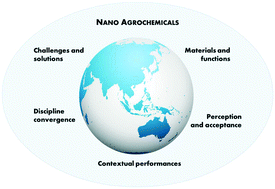Emerging investigator series: nanotechnology to develop novel agrochemicals: critical issues to consider in the global agricultural context
Abstract
Research and development on potential use of nanotechnology in agriculture have intensified exponentially over the last decade. Claims of superior efficacy, lower costs, improved sustainability etc. relative to conventional practices have been made. The promises, however, are not always fully substantiated, and thus may even prove counter-productive. Considering the shifts in drivers for the development of nano-enabled solutions, regulatory and public perception and to geographical discrepancies in terms food production, we reflect on how the proposed nano-enabled solutions are likely to meet the need in the global agricultural context. The potential of nanotechnology to reduce undernourishment and food insecurity at the global scale remains largely uncertain. Nanotechnology needs to align with the unique needs of emerging economies, where the scope of improvements are large but challenges abound. Regulatory requirements under development are extremely stringent for nanoformulations as the fate and hazard of different components (i.e. active substance, co-formulants and other adjuvants) need to be considered individually as well as together, which is typically not required for conventional agrochemicals. Organic nanocarriers are particularly difficult to track in food and environment and it is not always clear how regulatory requirements may be fulfilled. From our perspective, less focus should be placed on trying to define a clear boundary between nano vs. non-nano as it may slow down the uptake of innovations that will improve agrochemicals. More work is also needed to successfully design and synthesise materials that can outperform current agrochemicals through molecular-level tuning of properties. New approaches suitable for life cycle assessments of both nano and conventional agrochemicals are needed to support comparative evaluations. Besides, a global context, a multidisciplinary/interdisciplinary approach and a collective thrust by innovators is a must for realisation of true potential of nanotechnology in food and environment sector.

- This article is part of the themed collection: Emerging Investigators Series


 Please wait while we load your content...
Please wait while we load your content...